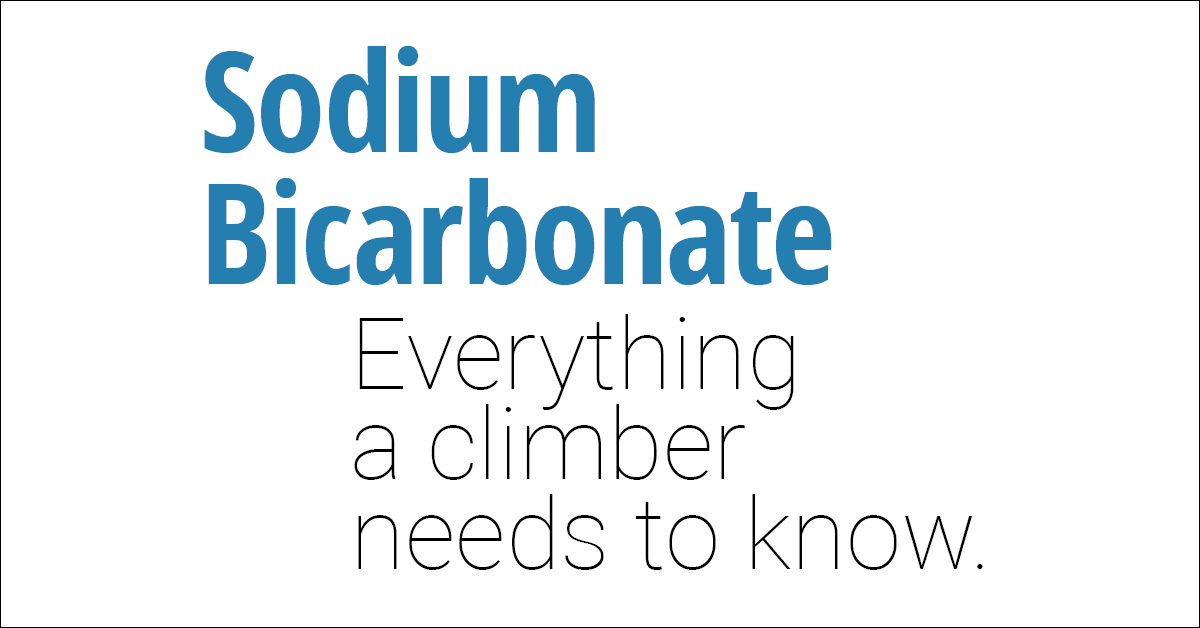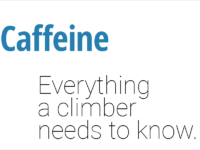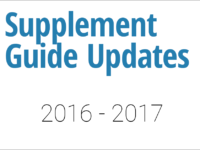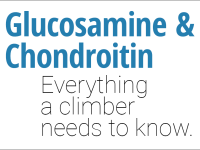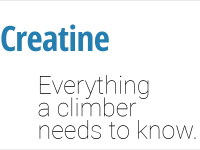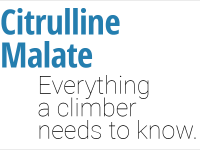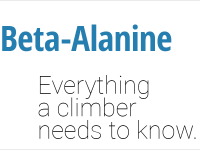Chances are this supplement is already in your kitchen cabinet: baking soda, AKA sodium bicarbonate. Sodium bicarbonate temporarily boosts your blood’s pH and bicarbonate levels, increasing your capacity to buffer high-intensity exercise.
Unlike other buffers like creatine and carnosine (from beta-alanine), bicarbonate is a blood buffer—it chills outside of the muscle cells. And because bicarbonate is a blood buffer, it actively encourages H+ ions to leave the muscles and enter the blood where bicarbonate can absorb them. This is unlike intramuscular buffers, which can only temporarily absorb the stream of H+ ions within each individual muscle cell.
Unfortunately, since bicarbonate is in the blood and not the cells, our body will only hold onto it for a short period of time. After levels spike, excess bicarbonate is cleared rapidly through the urine and thus has only transient effects (a few hours max) compared to the weeks-long benefits of some other supplements.
In order to get continued benefit from sodium bicarbonate, you would need to take it every time you trained. For reasons that will be discussed later, this is impractical. That being said, sodium bicarbonate is still a potent ergogenic aid, and its transient nature makes no difference for those one-time shots you really want to get right, such as a final day working a project or competitions.
The Benefits of Sodium Bicarbonate
Bicarbonate is our body’s single most important buffering system (for the blood, anyway), and is a normal byproduct of breathing—sodium bicarbonate increases blood bicarbonate levels even further than normal respiration allows. When bicarbonate levels exceed normal, buffering capacity is improved and the muscles can maintain power for greater periods of time.
The primary benefit of sodium bicarbonate, therefore, is increased power endurance—your ability to maintain a high level of power over an extended period of time.1–19 In the case of sodium bicarbonate, you need to be exercising for approximately 1 minute before its effects become noticeable. In the range of 1-4 minutes, though, you can expect an estimated increase in endurance of 1.7% to 3.3%,1,2,4–6,9,15 and some studies note even greater benefits upwards of 16%.11,14,17
Sodium bicarbonate could also decrease perceived exertion,7,11 which would make a climb of a given difficulty seem easier. In addition to psychological comfort, perceived exertion has a real effect on our ability to press on, so decreasing perceived exertion can increase endurance.
Reality Check: While it’s nice to imagine that sodium bicarbonate could allow you to climb 16% longer or harder, it’s really unlikely you yourself will experience such a great benefit. But even a 2-3% improvement could be the difference you need, especially given the highly variable nature of climbing with easier sections interspersed among more challenging ones—so while sodium bicarbonate probably won’t make you an instant paragon of climbing, it can provide a very real edge.
Benefits for Sport Climbing
Power endurance is hugely important for sport climbing, as the most common (non-technical) reason a climber might fail is getting pumped. Sodium bicarbonate helps you prevent getting pumped in the first place, and also helps you avoid the rapid decrease in grip strength that occurs as the pump sets in.
Benefits for Bouldering
Most boulderers are not limited by power endurance, but rather maximum power; as such, sodium bicarbonate is of limited use. However, there are situations when even a boulderer might benefit from improved power endurance, such as during a comp when time is constrained. In these situations, sodium bicarbonate can improve recovery in the short time between problems and encourage power maintenance.
Benefits for Training
The rapid rate at which your body sheds excess blood bicarbonate makes sodium bicarbonate a less-than-ideal supplement for training simply because of the difficulty most people will have trying to take 3+ teaspoons of the substance every time they train. That being said, the extremely dedicated can experience significant benefits from training under its “influence”—and as with other supplements, boosts in power endurance during training mean longer, harder sessions, which mean greater training gains, which stack over time.
Adverse Effects
Sodium bicarbonate has the tendency to cause gastric upset. Depending on the person and how quickly or slowly they take their sodium bicarbonate, this can range from mild stomach rumblings to porcelain reenactments of Mt. Vesuvius. For this reason alone, it’s important to “practice” taking sodium bicarbonate before you need to take it for real so you don’t get surprised.
For similar reasons, it’s not wise to mix sodium bicarbonate with supplements that are acidic in nature like citrulline malate—the combination will make a baking soda and vinegar volcano in your stomach with only one exit.
Sodium bicarbonate is extremely high in sodium, which is not as large a problem as you may think as your body will excrete most of the excess sodium rapidly. If you are on a sodium-restricted diet, however, then this may not be the right supplement for you.
Dosage
As with many other sports supplements, the “best dose” is just the one that has been tested most frequently—in other words, it’s possible that a lower dose would be equally as effective, or that a higher dose would be more effective. Nonetheless, we have to work with what we have, and what we have suggests that the effective dose is 0.3 grams of sodium bicarbonate per kilogram of body weight (or about 0.14 grams per pound). There are 4.6 grams of sodium bicarbonate per teaspoon.
Approximately 2 hours before your event, mix the full dose of the sodium bicarbonate with 2-4 cups of water and stir until combined—you can also add 2-4 tablespoons of sugar to make it more palatable.* Drink slowly over 30 minutes to 1 hour. Be sure to wear chapstick as the sodium bicarbonate solution can be extremely drying on the lips!
Since sodium bicarbonate will neutralize your stomach acid, you should take it on an empty stomach.
*The extra energy provided by the sugar is not a big deal in the context of competition or final pushes on projects. Usually, you would aim to have blood glucose slightly elevated before the comp anyhow, though you also need to be careful not to have so much energy that you then spike insulin and crash. Since you’re consuming sodium bicarbonate on an empty stomach, the risk of spiking blood sugar is low, but this is again something to test before a big day!
What About “Serial Loading”?
One recent study used a “serial loading” protocol where the subjects took multiple smaller doses of sodium bicarbonate for several days before the event, but not on the day of the event itself.4 While this study apparently showed that this protocol was effective—the serial group had greater mean power than the placebo group—there’s also strong reason to suspect this might just have been statistical noise.
The data itself makes it clear why: on the day of the event, the serial loading group did not have statistically different bicarbonate levels (unlike the also-tested acute loading group). Since sodium bicarbonate works by boosting blood bicarbonate, this raises doubts about any witnessed performance improvements.
The study was also very small, which is unfortunately true of many sports science studies. Most supplement studies are subsequently repeated, however, and when those studies have consistent results then we have greater reason to trust their conclusions. The “serial loading” protocol has never been repeated (at least not yet), so there’s a limit to how seriously we can take its results.
Ultimately, we shouldn’t expect positive results from any sodium bicarbonate protocol that does not impact blood bicarbonate. As nice as it would be to find an easier protocol, it needs to increase blood bicarbonate to yield meaningful results. If it does not, then there is no probable mechanism behind its performance benefits, and we would expect it not to work.
How to Choose the Right Product
Sodium bicarbonate is baking soda, and baking soda is a kitchen staple. You probably already have some in your cabinet, and if you don’t, you can run out and get a box for under $1.
Given its ubiquity and cheapness, no major sports supplement companies sell it—and since it’s not a sports supplement, you really don’t need to worry about whether it’s been contaminated with adulterants that might flag a drug test. Thus, there’s not really any advice to give on how to choose the right product.
One word of warning: be sure to use baking soda, not baking powder.
Conclusion
Sodium bicarbonate is a highly effective supplement, but marred by its transient few-hours-only effect. Since it’s not an especially easy or pleasant supplement to take, this makes it best for one-time events that you really want to get right.
If you are a competitor, this supplement should be a ritual before each competition—but do practice using it beforehand so you don’t suffer any stomach issues in the midst of your crucial moment. If you’re on the last day of a climbing trip and are so close to finishing your project that you can taste it, then here too you might find benefit from sodium bicarbonate. Otherwise, you need a great tolerance to foul tastes to use sodium bicarbonate consistently.
The bottom line is that sodium bicarbonate is a helpful supplement, but not one you can easily use often. It’s cheap and readily available, but must be taken in such extreme amounts that it is impractical for all except exceptional times. Have it available, but only use it when something important is on the line.
